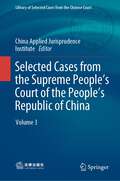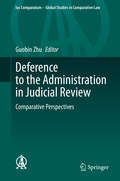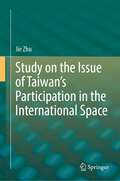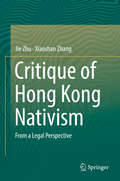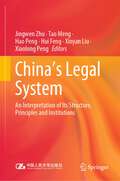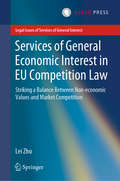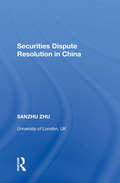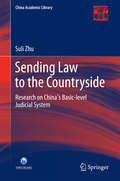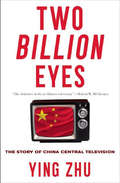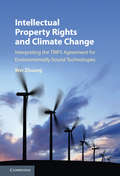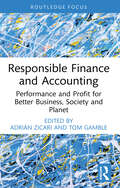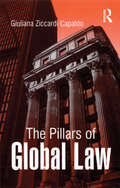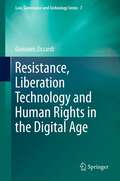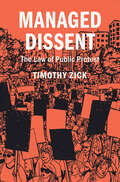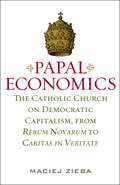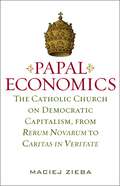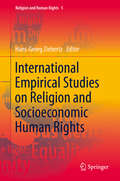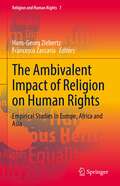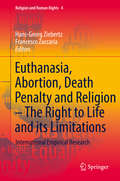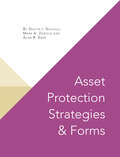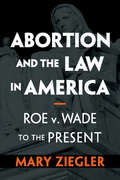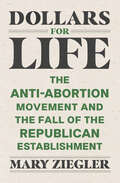- Table View
- List View
Selected Cases from the Supreme People’s Court of the People’s Republic of China: Volume 3 (Library of Selected Cases from the Chinese Court)
by Feng Zhu Hongyu Han Qiujing MaThis book includes guiding cases of the Supreme People’s Court, cases deliberated at the Adjudication Committee of the Supreme People’s Court, and cases discussed at the Joint Meetings of Presiding Judges from various tribunals. This book is divided into three sections, including Cases by Justices, Cases at the Adjudication Committee and Typical Cases, which will introduce readers to Chinese legal process, legal methodology and ideology in an intuitive, clear and accurate manner. This volume presents cases selected by the trial departments of the Supreme People’s Court of China from their concluded cases. In order to give full weight to the legal value and social function of cases from the Supreme People’s Court, and to achieve the goal of serving trial practices, serving economic and social development, serving legal education and legal scholarship, serving the rule of law in China, the China Applied Jurisprudence Institute, with the approval of the Supreme People’s Court, opts to publish Selected Cases from the Supreme People’s Court of the People’s Republic of China in both Chinese and English, for domestic and overseas distribution.
Deference to the Administration in Judicial Review: Comparative Perspectives (Ius Comparatum - Global Studies in Comparative Law #39)
by Guobin ZhuThis book investigates judicial deference to the administration in judicial review, a concept and legal practice that can be found to a greater or lesser degree in every constitutional system. In each system, deference functions differently, because the positioning of the judiciary with regard to the separation of powers, the role of the courts as a mechanism of checks and balances, and the scope of judicial review differ. In addition, the way deference works within the constitutional system itself is complex, multi-faceted and often covert. Although judicial deference to the administration is a topical theme in comparative administrative law, a general examination of national systems is still lacking. As such, a theoretical and empirical review is called for. Accordingly, this book presents national reports from 15 jurisdictions, ranging from Argentina, Canada and the US, to the EU. Constituting the outcome of the 20th General Congress of the International Academy of Comparative Law, held in Fukuoka, Japan in July 2018, it offers a valuable and unique resource for the study of comparative administrative law.
Study on the Issue of Taiwan’s Participation in the International Space
by Jie ZhuThis book points out the legal roots of the alignment of Cross-Strait political relations and the issues of Taiwan's participation in international space, and the Treaty of San Francisco and the “Undetermined Status of Taiwan”. Based on an academic standpoint, the book studies the legal theories related to the alignment of Cross-Strait political relations and the issues of Taiwan's participation in international space from the Mainland Chinese perspective. It focuses on the different descriptions and regulations of the alignment of Cross-Strait political relations between the Mainland of China and Taiwan and discusses the status, forms, problems, and prospects of the coexistence of the two sides in the international space. Compared with the policy oaths used in current studies, the book systematically discusses the alignment of Cross-Strait political relations and the issues of Taiwan's participation in international space with a theoretical interpretation. It uses detailed historical materials, especially valuable policy documents and excerpts of speeches cited of the Mainland of China. This book puts forward a series of important propositions, such as the construction of a mechanism for Taiwan’s orderly participation in the international space and means of existence of the Taiwan region in the international space.
Critique of Hong Kong Nativism: From a Legal Perspective
by Jie Zhu Xiaoshan ZhangThis book focuses on the separatist trend in Hong Kong, which it approaches by drawing on historical studies, political analysis, social studies and legal analysis. It offers a comprehensive and interdisciplinary guide to the topic, addressing the historical evolution of “Hong Kong Nativism,” the theoretical connotations and fallacies of “Hong Kong Independence,” and the legal measures taken to forestall it. Written by mainland scholars who approach the subject matter from a legal perspective, the book offers revealing insights for all students and researchers who are interested in Hong Kong Basic Law and the current political situation in Hong Kong.
China's Legal System: An Interpretation of Its Structure, Principles and Institutions (Understanding China)
by Jingwen Zhu Tao Meng Hao Peng Hui Feng Xinyan Liu Xiaolong PengThis book provides a systematic and detailed introduction to the formation process and current development of China's socialist legal system. The classification of the constitution and constitution-related laws, criminal law, civil and commercial law, administrative law, economic law, litigation and non-litigation procedural law, social law, and the specifics of each sector of law are explained, which is a good guide for understanding the framework of China's legal system and the study of each sector of jurisprudence.
Services of General Economic Interest in EU Competition Law: Striking a Balance Between Non-economic Values and Market Competition (Legal Issues of Services of General Interest)
by Lei ZhuThis book provides a comprehensive examination of the interaction between Services of General Economic Interest (SGEI) and EU competition law, covering in particular Article 106 of the Treaty on the Functioning of the European Union (TFEU) and state aid rules. It also takes the telecommunications, postal service and transport sectors as case studies, taking into account the technological, economic and political backgrounds to these sectors.The area of SGEI has undergone fundamental developments over the past three decades and the most recent changes in the Lisbon Treaty, recognizing SGEI as a shared value and granting explicit competence to the EU, mark its constitutional significance. The key issue is how to balance economic values underlying competitive markets and non-economic public service values such as universal access to essential services. The essence of the question is the relationship between the market and the state. This controversial issue is addressed through a critical analysis of a number of landmark EU Court judgments and Commission decisions over the decades.Offering a clear appreciation of the evolution of the EU regulatory framework on SGEI that lays out the limits and boundaries within which the Member States define, organize and fund SGEI, the book is particularly aimed at academics with a research interest in the interaction between public services and EU competition law, but as it also demonstrates clearly how the application of EU competition law has transformed the public utilities sectors, it will be of interest to law makers, legal professionals and policy makers as well.Dr. Lei Zhu is a Research Associate at the Institute of International Law at Wuhan University in Wuhan, China. He studied at the Institute for Competition & Procurement Studies of the Bangor University Law School in Wales, United Kingdom, where he obtained his PhD in law in 2015.
Securities Dispute Resolution in China
by Sanzhu ZhuSecurities Dispute Resolution in China is a comprehensive and detailed study of the increasingly important issue of how cases involving securities are dealt with by Chinese courts, commissions and other administrative authorities and by arbitration and mediation in the PRC. The work identifies the nature and types of securities disputes and the various procedures, including alternative dispute resolution, used to address them. This timely, groundbreaking book is particularly relevant at a time of growing foreign investment in China's securities market. The volume will be an invaluable resource for researchers and practitioners in developed as well as emerging markets.
Sending Law to the Countryside
by Suli ZhuBased on empirical investigation and an interdisciplinary approach, this book offers a crucial theoretical work on China's basic-level judicial system and a masterpiece by Professor Suli Zhu, a prominent jurist on modern China. Its primary goal is to identify issues - ones that can only be effectively sensed and raised by China's jurists because of their unique circumstances and cultural background - that are of practical significance in China's basic-level judicial system, and of theoretical significance to juristic systems in general. Divided into four parts, the book begins with a discussion of the systematic and theoretical problems in China's basic-level judicial system at the macro-, meso- and micro- scale. In the second part, it examines the technology and knowledge to be found in the basic-level judicial system, so as to make the traditionally "invisible" technology and knowledge of trial judges available for general theoretical analyses. The third part focuses on the judge and other legal personnel in the judicial system, while the last part discusses the value of legal sociology surveys as powerful resources. This book not only presents essential features of China's judicial system by precisely describing key issues in its basic-level judicial system, but also offers well-founded content that accentuates the significance of social management innovation.
Two Billion Eyes: The Story of China Central Television
by Ying ZhuAs China navigates the murky waters of a "third way" with liberal economic policies under a strict political regime, the surprising battleground for China's future emerges in the country's highest rated television network--China Central Television, or CCTV.With 16 internationally broadcast channels and over 1.2 billion viewers, CCTV is a powerhouse in conveying Chinese news and entertainment. The hybrid nature of the network has also transformed it into an unexpected site of discourse in a country that has little official space for negotiation. While CCTV programming is state sponsored--and censored--the popularity and profit of the station are determined by the people. And as the Chinese Communist Party seeks to exert its own voice on domestic and international affairs, the prospect of finding an amenable audience becomes increasingly paramount.Through a series of interviews with a fascinating cast of power players including a director of a special topic program that incited the 1989 student movement, current and past presidents of CCTV, and producers at the frontline of the network's rapidly evolving role in Chinese culture, celebrated media analyst Ying Zhu unlocks a doorway to political power that has long been shrouded in mystery.
Intellectual Property Rights and Climate Change: Interpreting the TRIPS Agreement for Environmentally Sound Technologies
by Wei ZhuangAs the world confronts global warming, there is a growing consensus that the TRIPS Agreement could be a more effective instrument for mitigating climate change. In this innovative work, Wei Zhuang systematically examines the contextual elements that can be used in the interpretation of the TRIPS Agreement with a view to enhancing innovation and transfer of environmentally sound technologies. Zhuang proposes a balanced and pro-competitive interpretation that could be pursued by policy makers and negotiators. This comprehensive, multidisciplinary study will help academics and policymakers improve their understanding of the contemporary international legal regimes governing intellectual property rights and innovation and transfer of environmentally sound technologies. It also offers practical guidance for further developing a legal system capable of responding to the challenges posed by climate change.
Chuang Tzŭ: Taoist Philosopher and Chinese Mystic
by Zhuang Zi Herbert A. GilesChuang Tzŭ belongs to a period three or four centuries before Christ. A disciple of Lao Tzŭ, his writings, which as a consequence are mostly allegorical, are an attempt to refute the materialistic Confucian teaching that arose after Lao Tzŭ's death. Although Chuang Tzŭ failed in his aims, he left a work of marvellous literary beauty and great originality. This classic translation makes Chuang Tzŭ available to English readers with the aid of a running commentary incorporated in the body of the text.
Responsible Finance and Accounting: Performance and Profit for Better Business, Society and Planet (Routledge COBS Focus on Responsible Business)
by Adrián Zicari Tom GambleThe UN Sustainable Development Goals, an increasing interest in Environmental, Social, and Governance factors, the climate crisis, stakeholder pressure, the lessons of corporate scandals, and the COVID-19 pandemic have triggered a massive change in how companies approach finance and accounting practices. From being a ‘nice-to-have’ to becoming a ‘must-have’, Responsible Finance and Accounting positions itself as a key pillar in tomorrow’s better world for business, society, and planet. In this book, leading researchers and practitioners in the field of corporate social responsibility, from the schools and corporate partners of the Council on Business & Society, give you key insights into green finance and social and environmental reporting, national, international and corporate stakes in green taxonomy and carbon tax, and triple capital accounting. It also details how to model effective and low-cost social impact reporting, ethics in finance and accounting, and strategies for microfinance and finance-related social innovation. Each insight is accompanied by key takeaways, food for thought, and micro-case study sections. This accessible book will be a valuable resource for scholars, instructors, and upper-level students across finance and accounting as well as corporate social responsibility and business ethics. It will also serve as a guide for professionals aiming to deepen their understanding of new finance and accounting practice.
The Pillars of Global Law
by Giuliana Ziccardi CapaldoThis book deals with the transformation of the international legal system into a new world order. Looking at concepts and principles, processes and emerging problems, it examines the impact of global forces on international law. In so doing, it identifies a unified set of legal rules and processes from the great variety of state practice and jurisprudence. The work develops a new framework to examine the key elements of the global legal system, termed the 'four pillars of global law': verticalization, legality, integration and collective guarantees. The study provides an in-depth analysis of the differences between traditional international law and the new principles and processes along which the universal society and world power are organized and how this is related to domestic power. The book addresses important changes in key legal issues; it reconstructs a complex legal framework, and the emergence of a new international order that has still not been studied in depth, providing a compass that will prove a useful resource for students, researchers and policy makers within the field of law and with an interest in international relations.
Resistance, Liberation Technology and Human Rights in the Digital Age
by Giovanni ZiccardiThis book explains strategies, techniques, legal issues and the relationships between digital resistance activities, information warfare actions, liberation technology and human rights. It studies the concept of authority in the digital era and focuses in particular on the actions of so-called digital dissidents. Moving from the difference between hacking and computer crimes, the book explains concepts of hacktivism, the information war between states, a new form of politics (such as open data movements, radical transparency, crowd sourcing and "Twitter Revolutions"), and the hacking of political systems and of state technologies. The book focuses on the protection of human rights in countries with oppressive regimes.
Energie aus Biomasse - ein ethisches Diskussionsmodell
by Michael Zichy Christian Dürnberger Beate Formowitz Anne UhlEnergie aus Biomasse wird auf politischer, wissenschaftlicher und gesellschaftlicher Ebene höchst kontrovers diskutiert. – Dieses Buch liefert eine fundierte, klare und gut verständliche Analyse und Diskussion der ethischen und kulturell-emotionalen Aspekte von Energie aus Biomasse. Es diskutiert die Frage der Verantwortung und bringt naturwissenschaftliche und ethische Expertise in einen fruchtbaren Dialog. Vergleichende Fallstudien und Szenarien sorgen für die praktische Anbindung an die derzeitige landwirtschaftliche Praxis. Die zweite, überarbeitete Auflage bezieht sich auf die aktuellen gesetzlichen Rahmenbedingungen und berücksichtig die neuesten wissenschaftlichen Beiträge zum Diskurs, wie zum Beispiel zu indirekten Landnutzungsänderungen.
The Cosmopolitan First Amendment
by Timothy ZickWe live in an interconnected world in which expressive and religious cultures increasingly commingle and collide. In a globalized and digitized era, we need to better understand the relationship between the First Amendment to the United States Constitution and international borders. This book focuses on the exercise and protection of cross-border and beyond-border expressive and religious liberties, and on the First Amendment's relationship to the world beyond US shores. It reveals a cosmopolitan First Amendment that protects cross-border conversation, facilitates the global spread of democratic principles, recognizes expressive and religious liberties regardless of location, is influential across the world, and encourages respectful engagement with the liberty regimes of other nations. The Cosmopolitan First Amendment is the product of historical, social, political, technological and legal developments. It examines the First Amendment's relationship to foreign travel, immigration, cross-border communication and association, religious activities that traverse international borders, conflicts among foreign and US speech and religious liberty models, and the conduct of international affairs and diplomacy.
Managed Dissent: The Law of Public Protest (Cambridge Studies on Civil Rights and Civil Liberties)
by Timothy ZickThe mass street demonstrations that followed the 2020 police murder of George Floyd were perhaps the largest in American history. These events confirmed that even in a digital era, people rely on public dissent to communicate grievances, change public discourse, and stand in collective solidarity with others. However, the demonstrations also showed that the laws surrounding public protest make public contention more dangerous, more costly, and less effective. Police fired tear gas into peaceful crowds, used physical force against compliant demonstrators, imposed broad curfews, limited the places where protesters could assemble, and abused 'unlawful assembly' and other public disorder laws. These and other pathologies epitomize a system in which public protest is tightly constrained in the name of public order. Managed Dissent argues that in order to preserve the venerable tradition of public protest in the US, we must reform several aspects of the law of public protest.
Papal Economics
by Maciej Zieba"For a long time to come, this book may well be the definitive work on the economic teaching of the modern popes." --MICHAEL NOVAKThe Catholic Church has long been one of the most important--but least understood--authorities on capitalism and democracy.The confusion and controversy didn't begin with Pope Francis. For well over a century popes have offered profound reflections on the economic and political order in their social encyclicals. But this estimable intellectual tradition has often been misunderstood, with partisan groups variously proclaiming Catholic social teaching to be left-wing or right-wing, pro-socialist or pro-capitalist or even pro-"third way."Papal Economics corrects the record. Father Maciej Zieba's incisive analysis shows that the Church displays a profound understanding of democracy and--perhaps more surprising--strong support for free markets. As Father Zieba demonstrates, popes have explicitly rejected socialism while praising a democratic state and market economy.Of course, this praise is not unqualified. Papal Economics shows how the Church, especially through John Paul's teachings, distinguishes true democracy from false, and praiseworthy capitalism from the kind to be rejected. Moving beyond the narrow confines of secular discourse, Catholic social teaching highlights the dangers that arise when the market and the state are elevated to absolutes in themselves--when man's spiritual dimensions are subordinated to his material ones. Ultimately, anyone who cares about free markets and democracy must understand, and defend, the foundations on which they are built. For as John Paul suggested, in a world without truth, freedom loses its meaning, the market loses its efficiency, and democracy yields to statism.
Papal Economics: The Catholic Church on Democratic Capitalism, from Rerum Novarum to Caritas in Veritate
by Maciej ZiebaPapal Economics corrects the record about one of the most important—but least understood—authorities on capitalism and democracy: the Catholic Church. Maciej Zieba, OP—a leading interpreter of the thought of Pope John Paul II—takes readers on an enlightening tour through the Catholic Church&’s social teaching on economics and governance. Examining papal pronouncements from the late nineteenth century to the present, Zieba shows that the Church displays a profound understanding of democracy and support for free markets. But this praise is not unqualified—a major reason why secular commentators of all stripes misinterpret Catholic social teaching. Updated with a brand-new afterword explaining the controversial economic teachings of Pope Francis, Papal Economics is the essential book for understanding the proper path forward.
International Empirical Studies on Religion and Socioeconomic Human Rights (Religion and Human Rights #5)
by Hans-Georg ZiebertzSocioeconomic rights include rights with regard to social security, labour and employment, as well as cultural rights which may be regarded as a shield for the protection of human dignity, especially of specific groups, such as women, children and refugees. The enforceability of socioeconomic rights clearly distinguishes them from other rights. These rights need, perhaps more than others, the support of civil society. Because states have leeway in how resources are distributed, civil society has a major impact on what resources are used to fulfil socio-economic rights. One of the actors in the public arena are religious traditions, respective Churches. Most of them have developed ethical standards for individual conduct and rules for living together in society based on their basic scriptures. All three monotheistic religions, Judaism, Christianity, and Islam, are marked by a caring engagement for the poor, the sick, the old and the foreign. From an empirical perspective, the general research question of this volume is how young people understand and evaluate socioeconomic rights and to which degree religious convictions and practices are connected with attitudes towards these human rights. Can religion be identified as a force supporting the human rights regime and which additional concepts strengthen or weaken the consent to these rights? The richness of empirical data contributes to a better understanding how socioeconomic rights are legitimated in the opinion of more than 10.000 respondents in 14 countries.
The Ambivalent Impact of Religion on Human Rights: Empirical Studies in Europe, Africa and Asia (Religion and Human Rights #7)
by Hans-Georg Ziebertz Francesco ZaccariaThis volume presents the most recent joint study of the research group Religion and Human Rights. This text is comprised of studies carried out in twelve countries and divided into three parts according to their respective tree continents. Almost 10,000 youths have participated and all chapters deal with the question of whether and to what extent religious or worldview convictions hinder or favor the support of human rights. Studies are comparative on multiple levels because of the many religious groups and countries. The studies take into account personal, religious and socio-cultural differences, showing the ambivalent role of religion in the striving to make the world safer, more democratic, just, and compassionate thru human rights. This text appeals to students and researchers.
Euthanasia, Abortion, Death Penalty and Religion - The Right to Life and its Limitations: International Empirical Research (Religion and Human Rights #4)
by Hans-Georg Ziebertz Francesco ZaccariaThis book considers how the termination of life might be accepted in the view of a general obligation to protect life. It features more than 10 papers written by scholars from 14 countries that offer international comparative empirical research. Inside, readers will find case studies from such areas as: India, Chile, Germany, Italy, England, Palestine, Lithuania, Nigeria, and Poland. The papers focus on three limitations of the right to life: the death penalty, abortion, and euthanasia. The contributors explore how young people understand and evaluate the right to life and its limitations. The book presents unique empirical research among today's youth and reveals that, among other concepts, religiosity matters. It provides insight into the acceptance, perception, and legitimation of human rights by people from different religious and cultural backgrounds. This investigation rigorously tests for inter-individual differences regarding political and judicial rights on religious grounds, while controlling for other characteristics. It will help readers better understand the many facets of this fundamental, yet controversial, philosophical question. The volume will be of interest to students, researchers, as well as general readers searching for answers.
Asset Protection Strategies & Forms
by Mark A. Ziebold Dustin I. Nichols Alan R. EberThe living trust has become almost mandatory in estate planning, but it is frequently offered without any thought to safeguarding the inheritance. However, children's inheritances in a living trust can be readily protected from creditors if it is made discretionary or includes shifting language. Asset Protection Strategies & Forms is a complete planning toolbox that provides you with a full range of domestic and international structures for safeguarding assets, from simple spendthrift trusts through equity strips to collapsing bridges. Structures are diagrammed and explained, with supporting law, tax considerations, case studies, and pattern clauses, making them easy to follow and explain. In addition to comprehensive explanations of the various asset protection options, this book offers over 90 forms, helping you do everything you need to protect your clients' assets, from basic client intake to avoid common problems, to setting up sophisticated international trusts for the highest protection. The living trust has become almost mandatory in estate planning, but it is frequently offered without any thought to safeguarding the inheritance. However, children's inheritances in a living trust can be readily protected from creditors if it is made discretionary or includes shifting language. Asset Protection Strategies & Forms is a complete planning toolbox that provides you with a full range of domestic and international structures for safeguarding assets, from simple spendthrift trusts through equity strips to collapsing bridges. Structures are diagrammed and explained, with supporting law, tax considerations, case studies, and pattern clauses, making them easy to follow and explain. In addition to comprehensive explanations of the various asset protection options, this book offers over 90 forms, helping you do everything you need to protect your clients' assets, from basic client intake to avoid common problems, to setting up sophisticated international trusts for the highest protection.
Abortion and the Law in America: Roe v. Wade to the Present
by Mary ZieglerWith the Supreme Court likely to reverse Roe v. Wade, the landmark abortion decision, American debate appears fixated on clashing rights. The first comprehensive legal history of a vital period, Abortion and the Law in America illuminates an entirely different and unexpected shift in the terms of debate. Rather than simply championing rights, those on opposing sides battled about the policy costs and benefits of abortion and laws restricting it. This mostly unknown turn deepened polarization in ways many have missed. Never abandoning their constitutional demands, pro-choice and pro-life advocates increasingly disagreed about the basic facts. Drawing on unexplored records and interviews with key participants, Ziegler complicates the view that the Supreme Court is responsible for the escalation of the conflict. A gripping account of social-movement divides and crucial legal strategies, this book delivers a definitive recent history of an issue that transforms American law and politics to this day.
Dollars for Life: The Anti-Abortion Movement and the Fall of the Republican Establishment
by Mary ZieglerA new understanding of the slow drift to extremes in American politics that shows how the antiabortion movement remade the Republican Party &“A timely and expert guide to one of today&’s most hot-button political issues.&”—Publishers Weekly (starred review) &“A sober, knowledgeable scholarly analysis of a timely issue.&”—Kirkus Reviews &“[Ziegler&’s] argument in [is] that, over the course of decades, the anti-abortion movement laid the groundwork for an insurgent candidate like Trump.&”—Jennifer Szalai, New York Times The modern Republican Party is the party of conservative Christianity and big business—two things so closely identified with the contemporary GOP that we hardly notice the strangeness of the pairing. Legal historian Mary Ziegler traces how the anti-abortion movement helped to forge and later upend this alliance. Beginning with the Supreme Court&’s landmark decision in Buckley v. Valeo, right‑to‑lifers fought to gain power in the GOP by changing how campaign spending—and the First Amendment—work. The anti-abortion movement helped to revolutionize the rules of money in U.S. politics and persuaded conservative voters to fixate on the federal courts. Ultimately, the campaign finance landscape that abortion foes created fueled the GOP&’s embrace of populism and the rise of Donald Trump. Ziegler offers a surprising new view of the slow drift to extremes in American politics—and explains how it had everything to do with the strange intersection of right-to-life politics and campaign spending.
